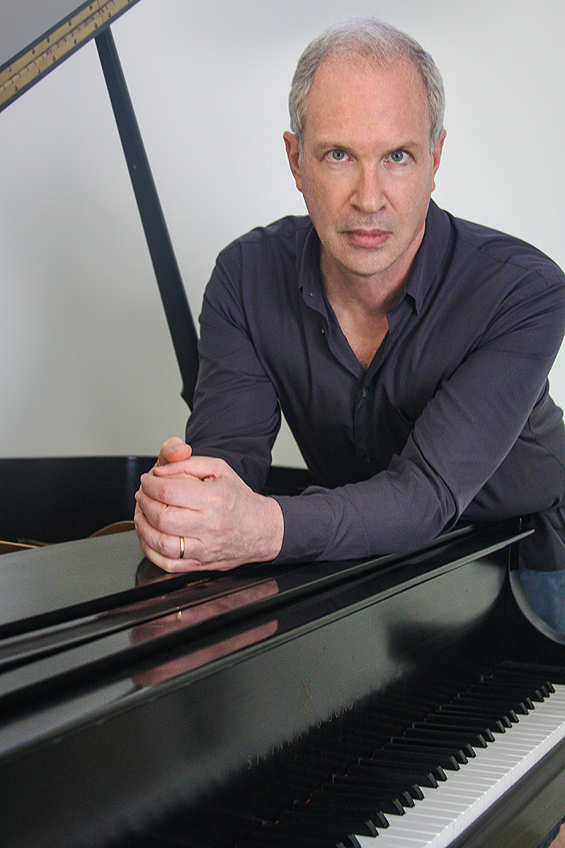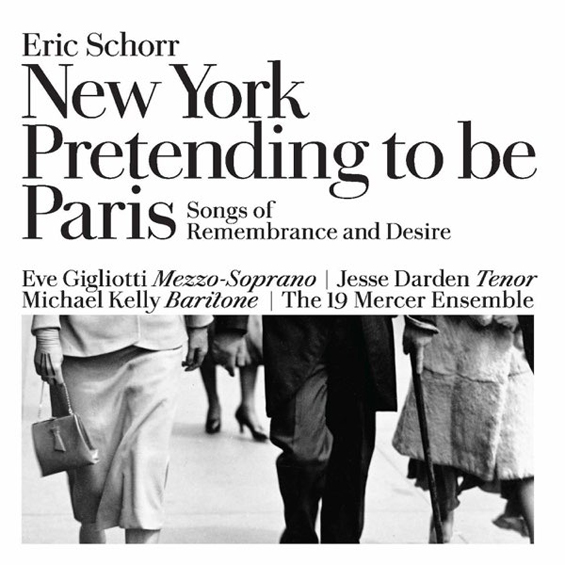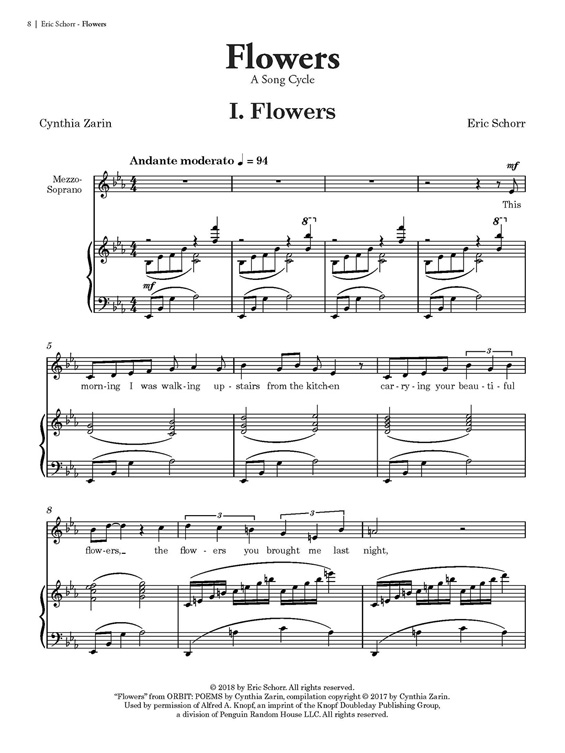

photo: Eric Schorr
FIVE QUESTIONS WITH ERIC SCHORR
Eric Schorr has written scores for numerous theatre productions, including The Doctor's Wife, a musical adaptation of Flaubert's Madame Bovary, and Frog Kiss, a musical based on Stephen Mitchell's novel, The Frog Prince (the book and lyrics in each case by Charles Leipart). The NYC-based composer, who studied at the New England Conservatory and holds degrees from Yale and Harvard, also wrote the music and lyrics for Young Tom Edison, a musical theatre piece for young audiences (book by Peter Parnell), and the music, lyrics, and libretto for the music-theatre piece Tokio Confidential, a recording of which was released on Broadway Records. He composed the award-winning Off-Broadway revue Whoop Dee Doo!, a recording of it available from RCA Victor, and has written vocal arrangements for multiple theatre companies and productions.
Schorr is also, however, a distinguished composer of art songs, and it is this that is the focus of this recent interview. His new release on Albany Records, New York Pretending to be Paris, is a glorious collection that testifies to his artistry and gift for setting music of complementary character to the words of contemporary poets (reviewed here). He benefits greatly from the involvement of others on the project, in particular orchestrator Nik Rodewald, 19 Mercer Ensemble, and vocalists Eve Gigliotti, Jesse Darden, and Michael Kelly. Schorr was asked about this and other related details when textura discussed the recording with him last month.
1. The bio at your site provides detail about the many different productions for which you created music, but aside from noting that you studied at the New England Conservatory and are a graduate of Yale and Harvard there's little else included about your background. In order to get a sense of how you ended up where you are, could you say a few words about where you grew up and now live, how your interest in composing music developed, and what led you to gravitate towards arts songs and theatre works?
Well, the relatively brief version is that I grew up in Boston, Massachusetts. My mother tells me that when I was three or four years old, I would visit her mother, who lived about forty-five minutes away by car, sit down at the piano and play melodies (probably simple nursery rhymes) by ear. My grandmother, who was an accomplished pianist and played for silent movies when she was a teenager, urged my parents to purchase a piano and enrol me in lessons in the “prep” program at the New England Conservatory. And so they did. I confess I didn't enjoy these lessons at first—I didn't understand why I should practice scales and learn to read music when I could just listen to something and play it. Eventually, I had an epiphany that learning to read music would enable me to play with ensembles and open up entire new musical worlds.
I was exposed to all kinds of first-quality music at a tender age. My parents had a wonderful record collection, everything from Brahms to Broadway musicals and Verve jazz albums. I attended “Young People's Concerts” presented by the Boston Symphony Orchestra and almost every musical that was trying out in Boston on its way to Broadway.
In college I took many composition courses and conducted orchestras for musicals. My first art song, an assignment for a composition course, was a setting of a poem by Yeats. I loved the challenge of setting lyrics, and I knew, pretty much instantly, that writing music for dramatic songs would form the core of my compositional life.
When I moved to New York City, where I now live, I played piano in Broadway pit orchestras and began my composition career in earnest. While I score for film and television productions, I prefer to compose for works that are performed live, such as art songs and music-theater.

2. One of the more striking things about the recording has to do with the text sources for the songs. You visited poetry bookshops in New York City and Cambridge and leafed through issues of The New Yorker, The New York Review of Books, and The New Criterion in search of poems that would resonate with you and strike you as promising for art song treatments. What prompted you to go this more labour-intensive route than simply pull a poetry anthology off the shelf and select pieces by Wordsworth, Auden, Dickinson, et al.?
I was determined to uncover poems that had never been set before, and I wanted to work with contemporary language and situations. As you point out, this took a lot of effort, but most labours of love do. I consider myself fortunate that all the poets with whom I desired to collaborate were willing to allow me to transform their poetry into song. They were, aside from those of us who worked on the album, the first ones to hear the finished products. I was always a bit trepidatious when I hit the e-mail send button with an MP3 file attached. It turns out, however, my fears were unfounded, for each poet enjoyed what they heard.
3. As I listen to the thirteen songs on New York Pretending to be Paris, words that don't come to mind are obscure and abstruse; one that does, on the other hand, is clarity, specifically clarity of concept and clarity of expression. Each song conveys a clear and distinct character that complements the text (your own eloquent description of the process appears in liner notes included with the release, that you aim to heighten the poem “emotionally by taking the music that is already inherent in the text and making it come alive in a different medium”). What are the qualities you aim for a song to have when it's finished?
Ideally, I would like each song to have an emotional impact on the listener, even on the first hearing, which is why the clarity of expression—both vocally and instrumentally speaking—to which you refer is so important. For a song to be satisfying, it must stand up to repeat listening, which means the melding of text and music is working to its utmost effect. I believe firmly in the power of the lyricism of melody to achieve this goal. A fellow composer once referred to my melodies as “unexpected but inevitable,” which is something I strive for. And, truth be told, if I don't enjoy a song on repeat listening, especially after spending some meaningful amount of time away from it, I know I still have work to do!

4. Even though the subject matter of New York Pretending to be Paris is diverse and its music eclectic, I hear common threads running through the songs having to do with desire for intimacy and belonging as well as the profound role memory plays in our lives. Could you comment on what you see as the major themes connecting the thirteen songs and how much those threads are reflections of your own preoccupations?
You hit the nail on the head when you mention desire for intimacy and the power of memory. The subtitle of the album, Songs of Remembrance and Desire, is a reference to the first lines of T.S. Eliot's The Wasteland: “April is the cruelest month, breeding / Lilacs out the dead land, mixing / Memory and desire…” In Eliot's poem, the promise of April is hobbled by memory and destined to result in disappointment. That's not an outlook to which I personally subscribe. I'm much more optimistic, in that while I tend to acknowledge the possibility of bad outcomes, I hope for the best. In the poems, many of the characters take risks—for example, embarking on a relationship that might or might not work out, or leaving an infant alone in a field in the hope that it might benefit from communing with a higher power. Taking risks enables us to generate memories, some pleasant, others not. Honestly acknowledging and confronting the painful ones enables us to forge a path forward, and that process, while extremely difficult, can ultimately prove rewarding. Personally, spending time with these poems and their characters has enabled me to grow, not just as a musician but, by accessing my own memory landscape, as a person. My hope is that by listening to these songs, others might be transported by a resonance with their own lives that will spark reflection—accompanied by affection or possibly the need for reexamination.
5. Another distinguishing aspect of the album has to do with arrangement, something instantly evident in the brilliant chamber orchestra presentation of Cynthia Zarin's Flowers song cycle. To that end, the album benefits from wonderful orchestrations by Nik Rodewald, a terrific range of instrumental timbres provided by 19 Mercer Ensemble, and, of course, the vocal artistry mezzo-soprano Eve Gigliotti, tenor Jesse Darden, and baritone Michael Kelly bring to the songs. Could you say a few words about how critical these collaborators were to the outcome?
Because the pandemic had deprived us musicians of opportunities to collaborate in person, we were starved for an opportunity to gather and work on the album. This made the project even more meaningful. I was absolutely blessed to work with all of the collaborators you mention. Each brought unique and abundant talent—as well as consummate preparation—to the project and was a pleasure to work with. I would like to give a special shout-out to Nik, who, by so expertly assigning instruments to the notes in my rather fastidiously detailed piano scores, created an expanded sound palette and texture that were perfectly suited to the emotional content of the music. As critical as all of these aforementioned participants were, the two people who were the most instrumental (pun intended!) to the recording and editing phases were Chip Fabrizi, our engineer, and Paul McKibbins, our producer. Recording and editing require the utmost attention to detail, musicianship and patience, and these two gentlemen have an abundance of all three.
BONUS QUESTION:
New York Pretending to be Paris is a beautiful collection on many counts—its soaring songs, performances, and arrangements combine to make it a genuinely special accomplishment, all of which makes me want to hear more of your music. What are you working on at the moment and what might we expect to see and hear from you in the future, be it on stage or on record?
Thanks for your very kind words. I've been very busy working on new art song commissions as well as two music-theatre projects. I'm always on the lookout for poetry that I can transform into song, so maybe in the not-too-distant future there will be another album along the lines of New York Pretending to be Paris.website: ERIC SCHORR
September 2022![]()